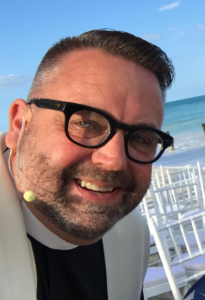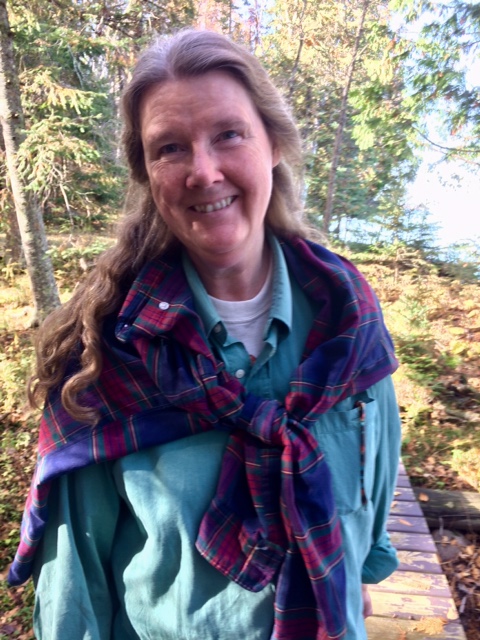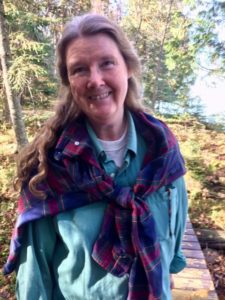In my first blog post as the Executive Director of ELM, I wrote about how I was one of “those” people. I am someone for whom “coming out as queer and coming out as a pastor has been a journey intimately intertwined.”
I recall watching the livestream of the 2009 ELCA Churchwide Assembly with tears in my eyes as the votes came in just over the margin needed to recognize me as a beloved child of God with a call to serve the church. What power that moment held – what power it still holds over us.
When I was in discernment, I did not know the stories of Jeff, Joel, Greg, Jim, Ruth, and Phyllis; I did not know about the Extraordinary Candidacy Project (ECP) or Lutheran Lesbian and Gay Ministries (LLGM); I didn’t know the stories of the countless queer and ally lay people who devoted years of their lives to transform our church.
I had a sense that I stood on the shoulders of giants, I just didn’t know their names.
As we approach the 30th anniversary of the first extraordinary ordinations, it has been a joy to feature the stories of some of those giants and to learn their names. And, we must also acknowledge, that in the retelling of ELM’s history there are glaring absences of the stories of our bi, trans, ace/aro, and intersex siblings as well as our queer siblings of color.
There is significant work that must be done to uncover the phobias and -isms of which we as a justice-seeking ministry are not immune so that we can repent and offer reparations so as to live more fully and truly into our values and our gospel-calling.
Today, we in the Lutheran tradition commemorate the Reformation by retelling the story of Martin Luther and his 95 theses. But, there was more to that story too.

In 2017, I participated in a 500th Anniversary tour of Germany with my parents where we went and viewed the historical Reformation sites: Wittenberg, Leipzig, Augsburg and more!
It was on this trip that my dad learned about Philip Melanchthon and all of his contributions, especially the Augsburg Confession – “why didn’t I ever hear about him in my confirmation classes?”
It was on this trip that I learned about Lucas Cranach the Elder and how his prints helped Luther tell the biblical stories through art. The trip gave me some perspective on the militaristic imagery that caused me angst in the song “A Mighty Fortress is Our God” when I saw the large, fortified castles that literally provided sanctuary to Luther and kept him safe during his life.
My mother was aghast at what Luther wrote about our Jewish siblings and how it was used by the Nazis during World War II – even worse, the ways the Lutheran Church allied itself with the Nazi party. “But, how could they?”
ELM seeks to be a movement that isn’t afraid to tell its whole story and won’t shut the door on those who wish to hold us to account – whether it’s 95 theses or 5 – with all of the change, accountability, and story-telling that goes along with it.
A movement is not one person and it is not immune from the phobias and -isms that plague our society. A movement must constantly be in motion and changing so that, in the words of Bishop Yvette Flunder, it doesn’t become a monument.
I think, when God called me to this ministry, the intentional intertwining of my marginalized identities with my call was meant to help prepare me for a ministry such as this. I pray daily that I am worthy of the call and am grateful for the giants and accountability partners who make it possible to continue the hard work of dismantling systems of oppression and injustice.
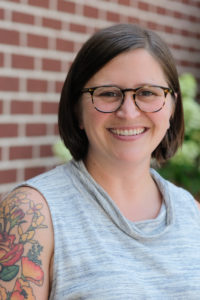
Rev. Amanda Gerken-Nelson (she/her/hers) is the executive director of ELM and in this role has the blessed job of meeting giants of this movement on a daily basis. Amanda and her wife, Tasha, are new homeowners and so they will have no life outside of house projects for at least the next five years.


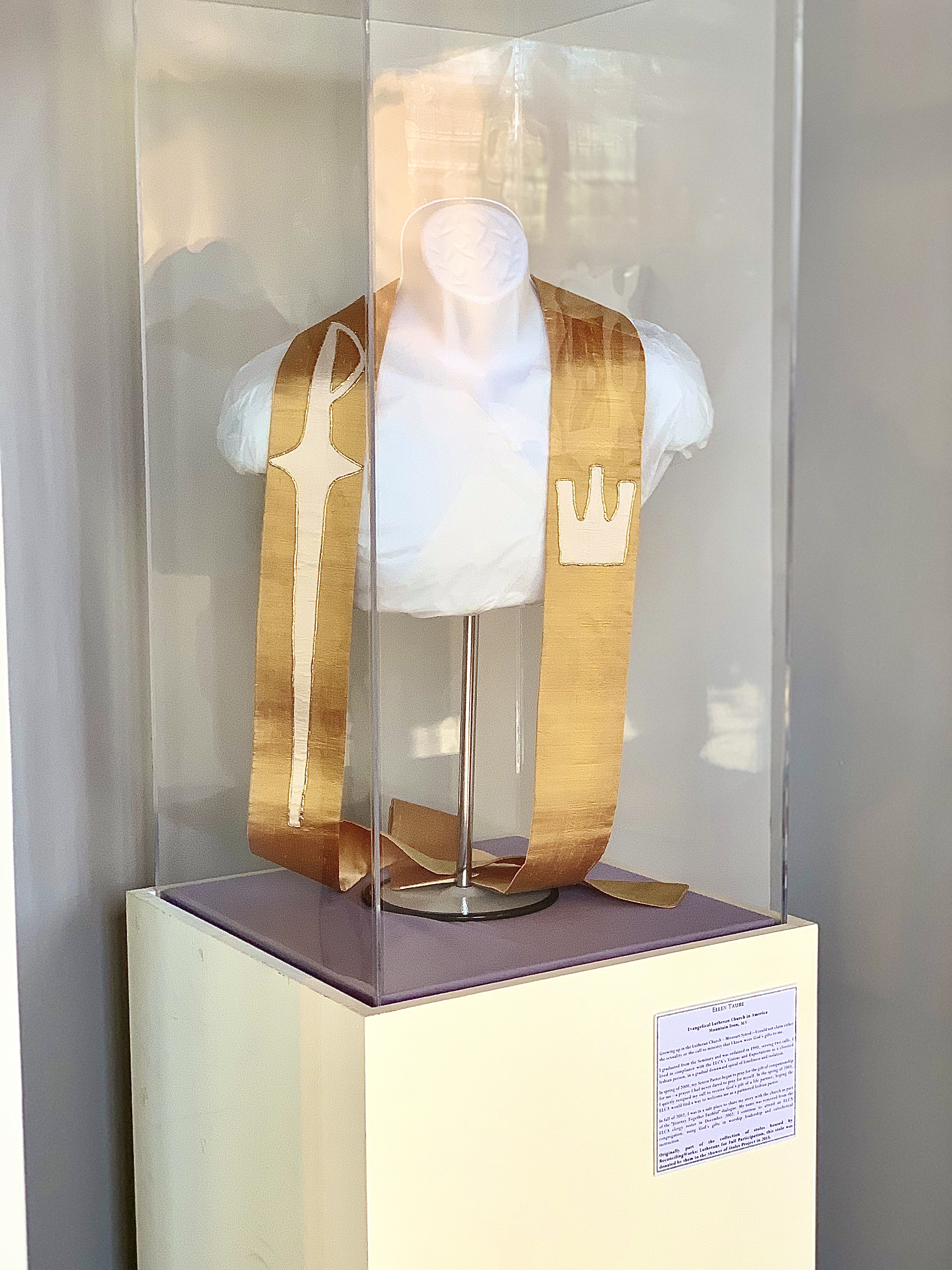
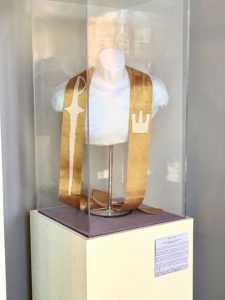
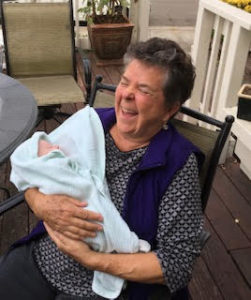 Larell Fineren (she, her, hers) retired from 50 years in nursing and now lives in Petaluma, CA. She keeps busy with the immigration fight and has applied to be a sponsor for a trans asylum seeker who’s currently detained. In her spare time she joyously welcomes new foster babies into her extended family, like little Annalee, our latest angel.
Larell Fineren (she, her, hers) retired from 50 years in nursing and now lives in Petaluma, CA. She keeps busy with the immigration fight and has applied to be a sponsor for a trans asylum seeker who’s currently detained. In her spare time she joyously welcomes new foster babies into her extended family, like little Annalee, our latest angel.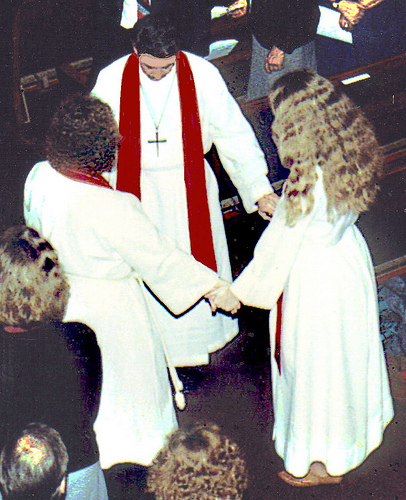
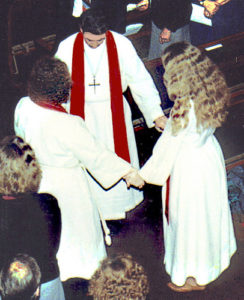 1990, they walked from the altar to the center of the sanctuary and held hands, just the three of them. Around them, the people—not just the ones in the stoles and robes—were invited to gather. They got close. They laid hands on one another. I wasn’t even born yet, and I know that the Holy Spirit was present. Watching the footage now fills me with a funny mix of awe and sadness.
1990, they walked from the altar to the center of the sanctuary and held hands, just the three of them. Around them, the people—not just the ones in the stoles and robes—were invited to gather. They got close. They laid hands on one another. I wasn’t even born yet, and I know that the Holy Spirit was present. Watching the footage now fills me with a funny mix of awe and sadness.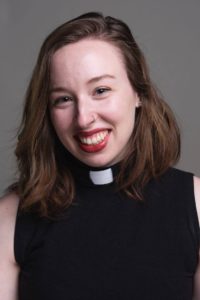 Cassie Hartnett (she/her/hers) grew up on the Connecticut shoreline and graduated from Union Theological Seminary in May 2019, where she studied psychology and religion, and wrote a new play for her thesis project. Previously, she studied at Barnard College and spent two years in the Twin Cities serving with the Lutheran Volunteer Corps, including work with ReconcilingWorks. In August, Cassie began her internship year at St. John’s Lutheran Church in Parkville, MD. In her spare time, she practices ballet and yoga, bakes excellent cookies, and can recommend a great queer young adult novel.”
Cassie Hartnett (she/her/hers) grew up on the Connecticut shoreline and graduated from Union Theological Seminary in May 2019, where she studied psychology and religion, and wrote a new play for her thesis project. Previously, she studied at Barnard College and spent two years in the Twin Cities serving with the Lutheran Volunteer Corps, including work with ReconcilingWorks. In August, Cassie began her internship year at St. John’s Lutheran Church in Parkville, MD. In her spare time, she practices ballet and yoga, bakes excellent cookies, and can recommend a great queer young adult novel.”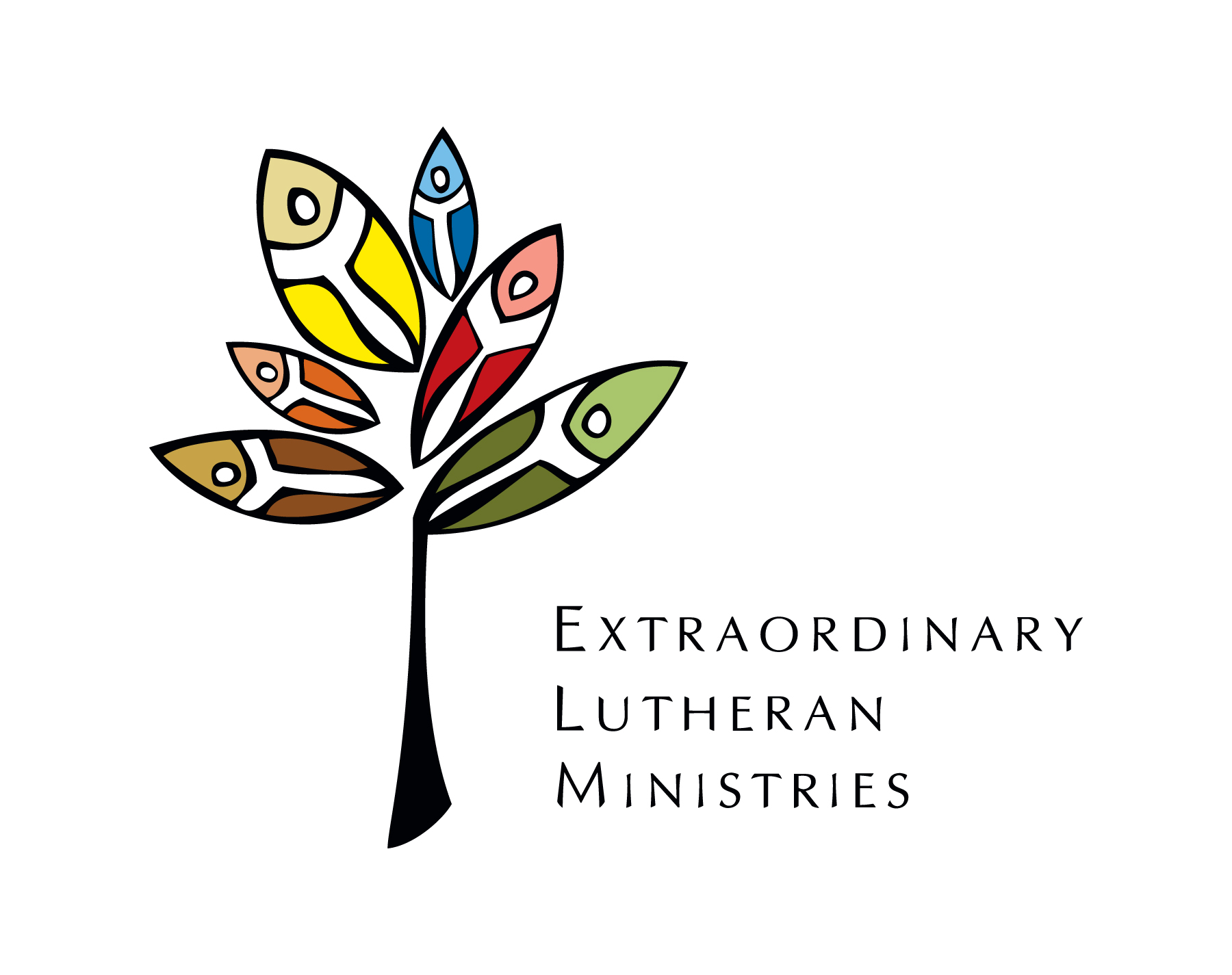
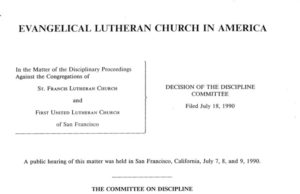 These two congregations were tried, suspended, and expelled from the ELCA. (Click link to read the full decision) Although it took ten years for the next one, fifteen other extraordinary ordinations occurred between 2000 and 2009. Two extraordinarily ordained pastors also received second calls. These calls and ordinations all happened because congregations (21 in all in the Evangelical Lutheran Church in America and the Evangelical Lutheran Church in Canada) were willing to risk discipline in order to call a candidate that they believed would best lead and serve their ministry. Some of them were disciplined, but all remained in the ELCA or ELCiC.
These two congregations were tried, suspended, and expelled from the ELCA. (Click link to read the full decision) Although it took ten years for the next one, fifteen other extraordinary ordinations occurred between 2000 and 2009. Two extraordinarily ordained pastors also received second calls. These calls and ordinations all happened because congregations (21 in all in the Evangelical Lutheran Church in America and the Evangelical Lutheran Church in Canada) were willing to risk discipline in order to call a candidate that they believed would best lead and serve their ministry. Some of them were disciplined, but all remained in the ELCA or ELCiC.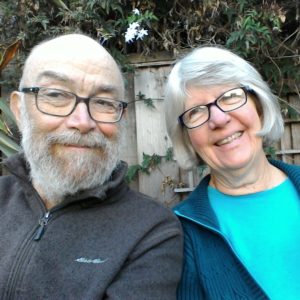
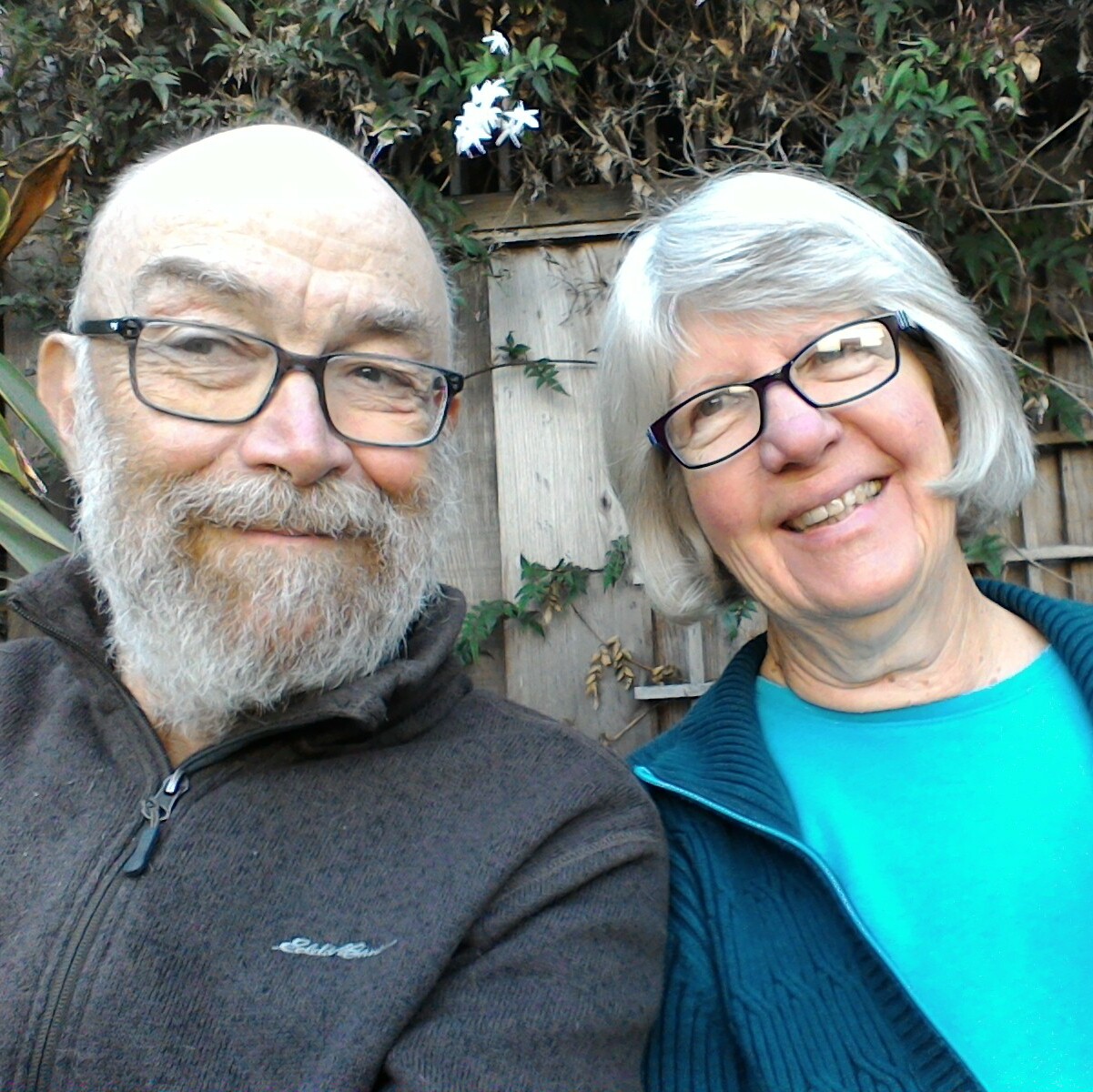
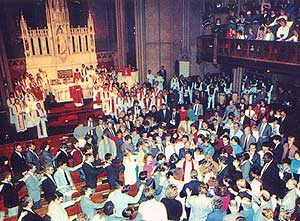 More than a few of those present for ordination in January, 1990 encouraged their home congregations to consider a more inclusive process for calling pastors. Some put their efforts into the newly-formed Lutheran Lesbian and Gay Ministries (LLGM), supporting ministries and congregations at risk by virtue of the ELCA policy of exclusion. Others established the Extraordinary Candidacy Project to certify qualified candidates for ministry excluded by ELCA’s requirement of celibacy for sexual minority pastors. Even others connected with Lutherans Concerned/North America (LC/NA, now Reconciling Works) or Wingspan or Soulforce or Goodsoil to work for policy change.
More than a few of those present for ordination in January, 1990 encouraged their home congregations to consider a more inclusive process for calling pastors. Some put their efforts into the newly-formed Lutheran Lesbian and Gay Ministries (LLGM), supporting ministries and congregations at risk by virtue of the ELCA policy of exclusion. Others established the Extraordinary Candidacy Project to certify qualified candidates for ministry excluded by ELCA’s requirement of celibacy for sexual minority pastors. Even others connected with Lutherans Concerned/North America (LC/NA, now Reconciling Works) or Wingspan or Soulforce or Goodsoil to work for policy change. 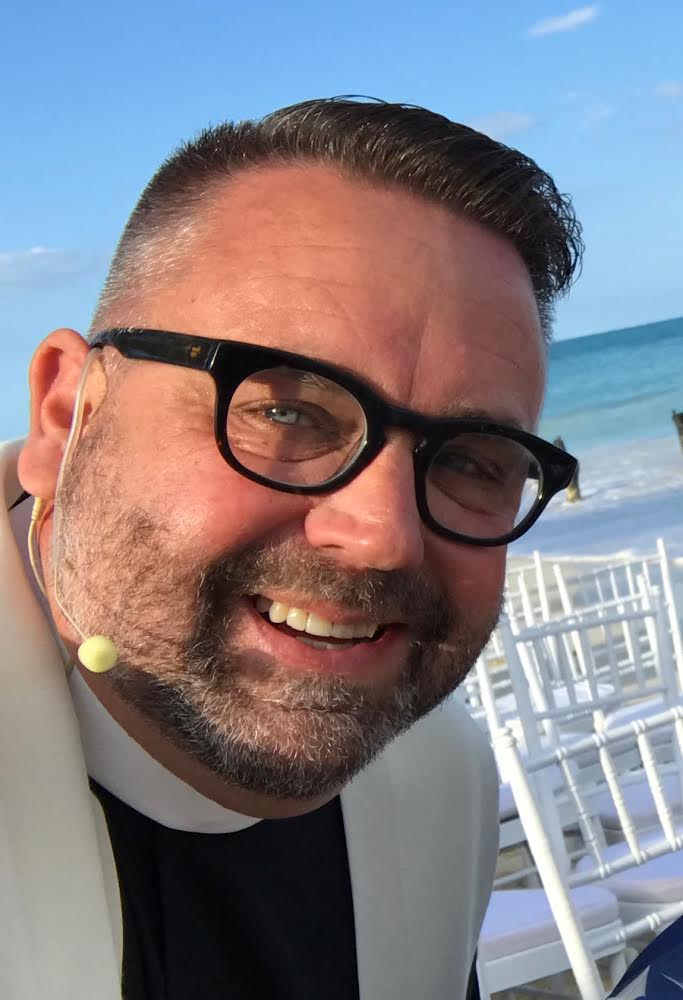
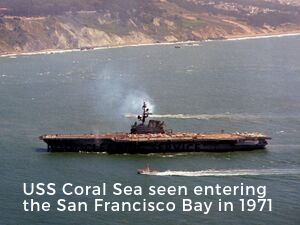 Berkeley, where I serve as pastor, declared itself to be a “sanctuary” during the Vietnam War for conscientious objector sailors on board the USS Coral Sea aircraft carrier anchored in the San Francisco Bay. The following month, the City Council of Berkeley took action and declared Berkeley to be a “sanctuary” for these sailors, becoming the first municipality in the country to identify itself in this way.
Berkeley, where I serve as pastor, declared itself to be a “sanctuary” during the Vietnam War for conscientious objector sailors on board the USS Coral Sea aircraft carrier anchored in the San Francisco Bay. The following month, the City Council of Berkeley took action and declared Berkeley to be a “sanctuary” for these sailors, becoming the first municipality in the country to identify itself in this way.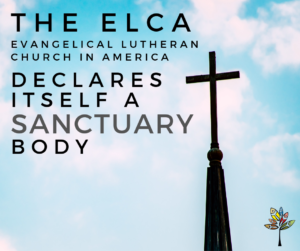 against asylum-seeking refugees was to declare the whole church to be in solidarity as a “sanctuary denomination.” Once again, there are no rules permitting such solidarity; indeed, there are federal laws against aiding and assisting undocumented migrants. But our church found the courage it needed to stand in solidary from a deeply held, faith-rooted vision for an alternative way of living together in the world that values conscience, dignity, and basic human rights; a way we see reflected in Gospel.
against asylum-seeking refugees was to declare the whole church to be in solidarity as a “sanctuary denomination.” Once again, there are no rules permitting such solidarity; indeed, there are federal laws against aiding and assisting undocumented migrants. But our church found the courage it needed to stand in solidary from a deeply held, faith-rooted vision for an alternative way of living together in the world that values conscience, dignity, and basic human rights; a way we see reflected in Gospel.